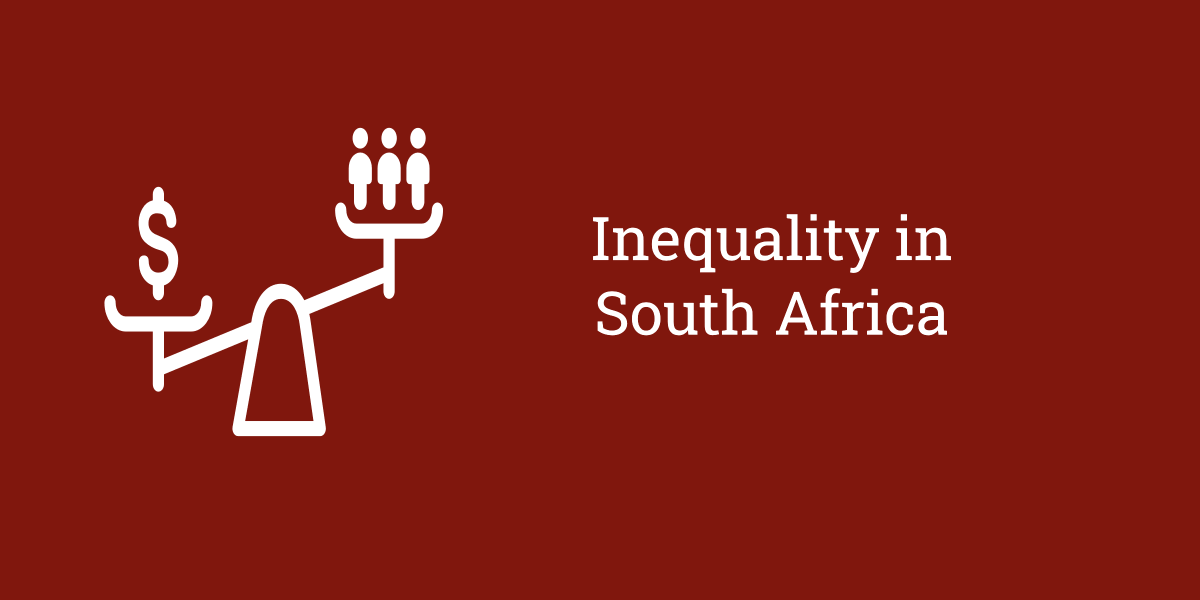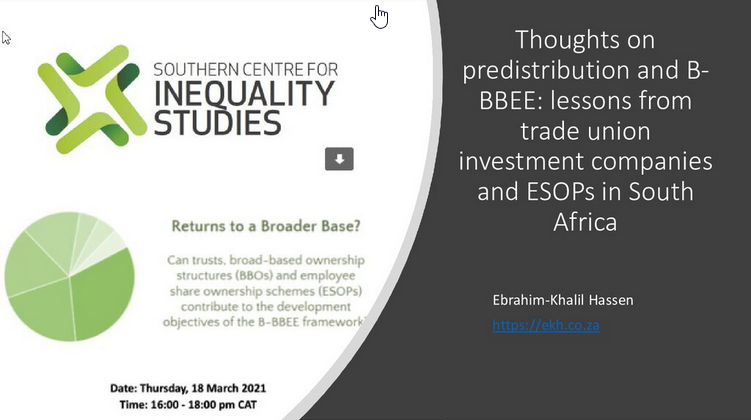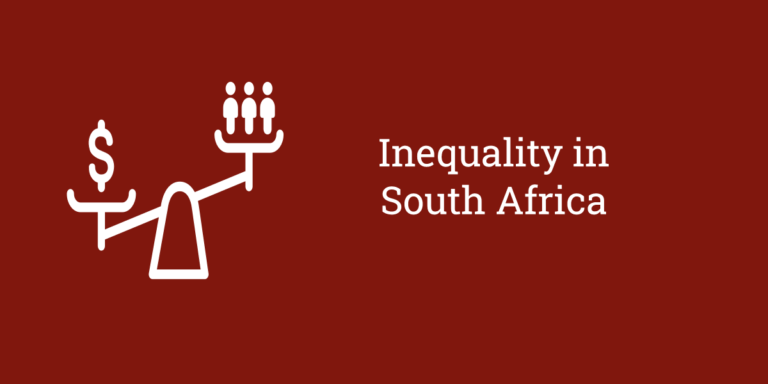Dear Ministers, Patel, Davies and Gordhan
Consider this letter a criticism that nevertheless appreciates the value of your recent work on creating the building blocks for a new development path in South Africa. After all, as our collective history indicates, power concedes nothing without demand. To which we might add, demands without mobilisation are futile.
I interpret the call for a new development path as a demand and a deliberate undertaking towards a more equal South Africa. On this matter, you have my support, as it clearly is unsustainable to have the poorest 10% of our population with access to only 0,6% of total national income, while the top 10% account for 53% of total income in South Africa.
Is it any wonder then that we have so many “service delivery” protests?
In this regard, I was particularly struck by the closing quote in Minister Patel’s recent address to Parliament. He closed with a quotation from Franklin D. Roosevelt, an American President and the architect of the New Deal. The essence of the quote is that we must remake society through the means at our disposal and emerge from it a stronger nation with an abundance of opportunity and fairer outcomes. It is a theme that ran through all the speeches you collectively delivered to parliament while presenting your budgets. You have offered an ambitious vision for the future.
However, I am having a really difficult time trying to reconcile this bold recognition of the need for change with the reality of power relations in the economy.
For instance, we are petitioning the World Bank for an enormous loan to finance the completion of a coal-fired power station. I read with discomfort Minister Gordhan’s defence of coal as a source of fuel in an article that he personally penned for the Washington Post. My discomfort is underpinned by the need to embrace a low carbon future with actions and not just words. In addition, my misgivings also lie in the fact that we are entering into this agreement because Eskom needs to complete the construction of a power station, not for the people of South Africa, but for electricity guzzling aluminium smelters that offer no sustainable benefits to the country’s economy – an economy which are told will be in peril, should South Africa not secure the World Bank loan.
Herein lies the contradiction with that particular argument. The price of electricity for these smelters is set at preferential rates, which benefits one large multinational company, BHP Billiton. At the same time, the electricity bill for my office and home will increase. Is it then completely illogical for me to conclude that South African citizens will not only be paying for the loan, but in effect, also be subsidising a large multinational company?
To add a little more, would this not be yet another example of a World Bank loan paid for by the public, while the benefits are privately accrued? I am heartened to note that this argument has some support among other large companies facing significant cost pressures as the price of electricity increases.
Be that as it may, the smelters also tell us about the power that is embedded in market relations — big companies already benefit from government activities, but are likely to benefit even more.
Surely a developmental state that has what is described as “embedded autonomy” would be autonomous enough to place the national interest above the interests of a multinational company?
This is no small matter. The cost of energy is a major impediment to moving towards much higher growth rates. The Budget Review sets out this challenge in stark terms via scenarios on economic growth and unemployment. In a low growth scenario, unemployment is predicted to be 19,8% in 2019. However, if we achieve economic growth of 6% between 2015 and 2019, the unemployment rate will be 13,8%, with over a million more jobs being created in comparison to the low growth scenario.
The overall picture is worrying, especially until 2014. The scenarios indicate that even under increased economic growth, we will not meet the goal of halving unemployment by 2014 — a target set at the Growth and Development Summit.
Industrial policy, consequently, becomes very important. I noted first with excitement, then with caution, Minister Davies’ indication that the anticipated outcomes of industrial policy would result in 2,5 million direct and indirect jobs by 2020. I was excited about the number of jobs he projected. A total of 2,5 million jobs is no small number given the slow pace at which our economy has historically created jobs, especially those that can provide a living wage.
But, my caution stems from the performance of industrial policy under the first Industrial Policy Action Plan (IPAP). Given its track record, we will need significant improvements in government’s performance and better responses from private firms to achieve Minister Davies’ goals.
Nevertheless, the prospect is tempting because in the event that we do achieve high rates of economic growth complemented by a successful implementation of industrial policy, we may conceivably yet achieve an unemployment rate below 13%. Perhaps one of the policy documents to be released by Minister Patel in the next year will clarify what contribution of jobs will be derived directly from economic growth and what contribution industrial policy will play.
But let me suggest that one of the proposals focus on steel. The current fight between Kumba Iron Ore and Accelor Mittal is important. Obviously something has gone wrong.
Government established a system whereby Kumba would provide cheap iron ore to Accelor Mittal and in turn, the anticipated outcome would be cheaper steel prices for the local industry. In spite of that we have today a variant of import parity pricing. I say a variant because the cost to manufacturers is still very high compared to the cost of producing steel.
Yet again, another multinational is benefiting. But, it is not the only one.
Kumba Iron Ore is hugely invested in by Anglo-American, which holds the majority shares. Government, through state-run Spoornet, provides a dedicated railway line for transporting iron ore from plant to port, with significant expansion of the line undertaken in the last few years to expand its capacity. In turn, Kumba pays for the cost of using the line. The rationale seems to be to utilise public resources to support the cheap export of iron ore even though cost recovery for Spoornet will be achieved over a long period of time.
Again, is it not logical to conclude that the multinationals on either side of the current dispute will benefit – whatever the outcome – but that the small manufacturer in Boksburg who uses the steel will not? More to the point, should we not be considering creating an environment for a competitor to Accelor Mittal, which may bring down prices instead of continuously supporting the export of raw materials?
I fully appreciate that these arrangements were entered into before your term of office, but they remain important because large players are effectively crowding out smaller players in the economy. The evidence is ample with a range of industries implicated in price fixing.
This raises the question: Where amongst the new policies being tabled is there support for the little guy?
In my reading, there is an impulse to support the little guy in the recent economic policy documents. For instance, the recent IPAP proposals for small scale milling in the wheat sector could help small farmers move up the value chain. The strong focus on making credit more readily available is also a policy stance from the Economic Development Department that I will be watching very closely, as it potentially turns dreams into viable businesses, which in turn create jobs. These are, however, merely impulses lost in an overall strategic stance that still values larger companies, supports exports and leaves the little guy out.
This criticism could be hyperbolic, but for the reality check: How will a ‘start-up’ receive support through the new strategies?
I simply cannot find easy entry points in the strategy, except for potentially better access to credit over the medium term. This unfortunately means that the current powerful players in the economy who have strong capacities for adapting to new environments are likely to remain powerful.
The less powerful in the economy should have more say.
For instance, according to the Department of Trade and Industry’s review of small business, Africans own the majority of informal businesses. When it comes to informal business, there are two positions. On the one hand, they could represent the future of expanding markets and creating jobs. On the other hand, they are dismissed as merely being survivalist and having owners who would readily swop informal trade for a government grant or a permanent job.
The truth is probably between these two extremes — that there are successful traders in informal markets who could justifiably wear the mantle of entrepreneur, while there are others that are survivalist enterprises, who are, in fact, trapped in poverty.
The problem, though, is that there is no entry point for successful informal traders to make the transition into the formal sector in the revised policies you present. In simple terms, the current policy assumes a formal business, but excludes many existing enterprises in the informal sector that are viable businesses. But then again, perhaps government could be supporting lending to viable informal businesses?
A big feature of industrial policy is the focus on leveraging procurement. The so-called “tenderpreneurs” must be salivating at the prospect. My main concern with this is that most businesses with a politically connected individual amongst its directors do not employ lots of people. I suspect what happens is that once a tender is won; the “tenderpreneur” company simply outsources the work to other companies. This is not just “passive shareholding,” but (unlike some BEE companies) the prospect of “tenderpreneur” companies moving into productive endeavours (i.e. employing people) is remote.
Thus, the intention to reform the procurement system is very important and the underlying logic must be akin to “win the tender and build a factory.”
In contrast to the “tenderpreneurs” are the many people that visit the Small Enterprise Development Agency, to convert into action the intention of starting up a business or growing an existing one. Usually, these are entrepreneurs without political connections or an asset base to serve as collateral for a loan. Nevertheless, the prospect of these entrepreneurs creating productive businesses and employment opportunities are better than the current meshing together of political influence and government contracts.
Giving them the requisite support requires changing the rules of the game. Perhaps this requires such a bold intervention as providing government funds as venture capital, obviously on the basis of a solid business plan. It may also mean providing significant tax incentives for ‘start-ups’ that could generate jobs, a proposal mooted by Minister Gordhan in his inaugural Medium-Term Budget Policy Statement.
One of the major lessons from developmental states in East Asia and more recently in India, Brazil and China, is that governments need to change the rules of the game. In our context, employment creation should be the number one rule.
Underpinning this should be an alliance between government and the little guy. The exact mechanisms can be debated, but the foundational element of an alliance between government and the little guy is missing in current policy. The aim of such an alliance would be to redistribute market-based opportunities to those excluded from the economy, on a scale consistent with creating a much more equal society. It is not that such ambition does not exist in government. For instance, Minister Nkwinti who is responsible for rural development and land reform recently told parliament that his department has a vision to create one job in every rural household, primarily through a programme of education and training for young people.
The proposals are too early to assess, but the logic is impeccable — create opportunities so that people might prosper. Hopefully, once the training is completed, credit should be provided. Industrial sector strategies should have entry points for these young recruits and markets should be less tightly controlled. I guess that is what is meant by “economic coordination.”
Sadly though it looks like the important changes being undertaken in economic policy will remain weak in the face of power relations that have been historically crafted and embedded in post-apartheid capitalism. This is not a matter of policy, but rather of power in society. A developmental state should be able to shift, or even nudge, power relations to open up space for inclusion in the economy.
On this note, there is apparently a force majeure clause in the deal on the aluminium smelters. However, government could adopt a wide range of measures in the interim, viz., enforce a new code of conduct governing business ownership amongst elected officials; a tax concession for small business could be easily financed; venture capital for small businesses could be harnessed through a social compact; procurement policy could be linked to investments; and so on. In sum, the space exists for a deeper and more thorough push to support economic inclusion than is currently articulated in your recent policy documents.
Now as Ministers, you could dismiss this as too radical. In my defence, I would say the arguments are more realistic than radical. After all, the proposals call for markets that are freer and for a reprioritisation of government spending and policy to support economic inclusion. Yet, I would readily concede that without a sustainable redistribution strategy, one couldn’t begin to foresee a significant reduction in poverty rates, inequality and unemployment within one generation. This requires significant changes in social policy, and significant improvements in the performance of our schools, hospitals and police stations.
However, it also requires shifting power relations embedded in market relations. In fact, without changing power relations within markets, all the good work on service delivery and strategies to improve public service performance are likely to come undone.
Yours in development,
Ebrahim-Khalil Hassen
This article was first published under creative commons license on South African Civil Society Information Service website.


